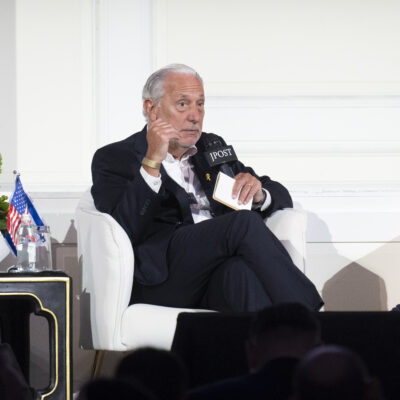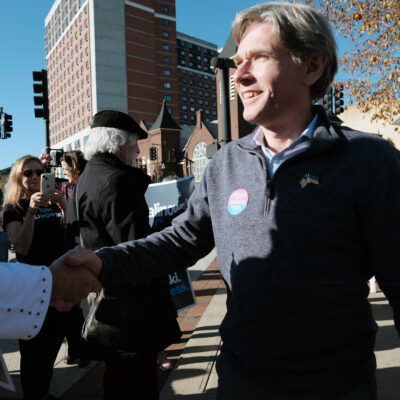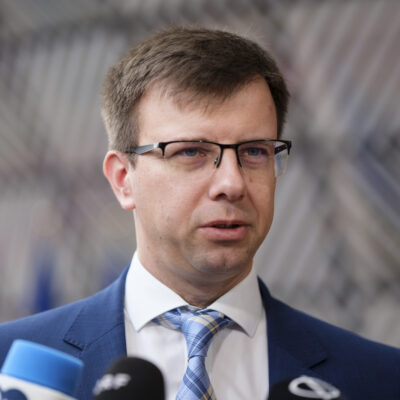
SUSAN WALSH/POOL/AFP via Getty Images
Ned Price leans into his Jewish values
Price, a former CIA analyst, traces his devotion to public service — and the ideals that he holds dearest — to his Jewish upbringing
Any given night, one might find State Department spokesperson Ned Price at a diplomatic reception around Washington. One Wednesday evening this past September, Price was among the guests at Israeli Ambassador Michael Herzog’s Georgetown residence for a Rosh Hashanah reception.
A group of partygoers was playing the whispered parlor game that takes place among Jewish politicos in the nation’s capital regarding personnel in presidential administrations. It’s a simple question: Is so-and-so official Jewish?
It’s often easy to answer — they speak about it publicly, like Secretary of State Tony Blinken discussing his stepfather, a Holocaust survivor; or Attorney General Merrick Garland sharing the story, at his Senate confirmation hearing, of his family fleeing pogroms in Eastern Europe a century ago. Second Gentleman Doug Emhoff has leaned into his status as the first Jewish person to hold that role, speaking often and openly about antisemitism and his Jewish upbringing.
“Several people were wondering whether Ned Price was Jewish. I said I might be able to find out,” recalled Rabbi Levi Shemtov, executive vice president of American Friends of Lubavitch (Chabad). So he did what Chabad rabbis learn early in their training: He went up to Price and simply asked.
“A few minutes later, I returned to them and said, ‘He tested positive,’” Shemtov joked. “What does that mean? I asked him whether he was Jewish and he immediately said yes. When asked whether I got into all the details, I said, ‘No, not really. I’m God’s agent. I’m not his enforcer. I didn’t have to make an inspection. I just made an inquiry.’”
“When I think back on what propels me and what motivates me, at the end of the day, it’s public service, and I think that is more than a political thing,” Price explained.
Price took up his position to great fanfare in January 2021, when he made history as the first openly gay person to serve in that role. But he didn’t require a Senate confirmation, and as a spokesperson, his job is to explain the U.S. government’s position on global challenges, and not to speak about his personal life. So it’s no surprise that Price hadn’t previously spoken about his Jewish faith in any public forum.
An emissary from Washington to the world, Price, who is 40 years old, is one of the most visible faces of America’s foreign policy. His professional journey to Foggy Bottom began with his time as a CIA analyst, but he traces his devotion to public service — and the ideals that he holds dearest — to his Jewish upbringing.
The son of a Jewish father and a Christian mother, Price grew up exposed to multiple faith traditions. He attended a private Episcopalian high school and went on to college at Georgetown, a Jesuit university. (It was watching smoke billow above the Pentagon from a Georgetown rooftop on 9/11 that led him to pursue a career at the CIA.) Price identifies as Jewish.
“When I think back on what propels me and what motivates me, at the end of the day, it’s public service, and I think that is more than a political thing,” Price explained to Jewish Insider during a recent conversation in his Foggy Bottom office. “I think it is also a drive that is rooted in a sense of values and a sense of principles that really come from every faith tradition to which I’ve been exposed to any degree, certainly from the Jewish faith, the emphasis — and especially in the congregation [Temple Emanu-El in Dallas] that I attended growing up — on the marginalized, a tradition that emphasizes empathy, a tradition that emphasizes service.”
That commitment to seeking out and elevating the voices of marginalized communities comes from his father, a Dallas attorney who took Price with him on trips around the world. The elder Price’s favorite destinations were not seaside resorts or any place that an ordinary person might choose as a vacation spot. Instead, he was drawn to far-flung locales such as Tibet, where he once went on a bike trip, or conflict-scarred nations like Peru during widespread protests over the controversial leader Alberto Fujimori, or even North Korea.
Now, if Price traveled to the places his dad loved most, he would spark international headlines.

“[I] would say, Americans absolutely should not go there,” Price said with a laugh, reminiscing on his father’s travel to North Korea. (The younger Price did not get to go to North Korea himself.) Looking back, Price’s most memorable trip was to Cuba, where he went as a teenager in the 1990s.
“You’re transported back in time,” he recalled. “As someone who knew that I wanted to be in foreign policy, you literally felt like an ambassador because maybe you were the first American that they had ever met. You have this, what felt at the time, like this awesome responsibility to represent the American people.” He went back to Cuba nearly two decades later, but this time he was serving as spokesperson for the National Security Council, and he arrived on Air Force One with then-President Barack Obama.
Price’s father always took Ned and the rest of the family to see “the extremes,” as Price put it. “There were places we went where you would see extreme opulence and in some places, extreme luxury, but he would be much more fascinated with seeing the other extremes, whether it was going to protests, which was sort of a favorite of his, or going to the more downtrodden neighborhoods, the places that tourists and certainly American tourists almost certainly never went.”
As a result, Price has a collection of “nostalgic propaganda” from regimes around the world — “not as a sign of support,” he quickly explained, “but just a reminder of the world that is well beyond our borders” — although these artifacts do not line the walls of his spacious State Department office.
Price follows in the footsteps of several previous Jewish spokespeople at the department, including Morgan Ortagus, who served before Price in the Trump administration.
“I would like to think that Ned’s approach to service and empathy and having a long and global view can be traced back to his Jewish roots,” said Eric Schultz, who served as deputy White House press secretary in the Obama administration. (Schultz lived across the street from Price for several years in Washington’s Shaw neighborhood, and they often celebrated Passover together. Eric Selbst, another frequent guest at Price’s Passover Seder, said “Dayenu” was a favorite song of Price’s.)
Like many American Jews — more than half of them, according to a 2020 Pew study — Price rarely attends synagogue.
“I see [Judaism] as something that connects me to family. I see it as something that connects me to friends. I wouldn’t want to overestimate the number of times that I’ve been to services in the past decade or so,” Price acknowledged.
Shemtov said of his conversation with Price, “I don’t know his whole life story. I didn’t ask him to submit an application. I just asked him a question as part of a conversation. You can see that he was very clear to say that he’s Jewish.”
“More Jews in America look like [Price and Emhoff] than like me,” he added. “It’s not really a surprise to anybody that I would identify Jewishly, simply from the way I appear. But for people who might not look like me and look more like people like Doug Emhoff and Ned Price, it’s important for them to know — there’s no reason to hide the fact you’re Jewish. And whatever degree of Judaism you do, or don’t practice, you still have that spark of Judaism.”
“You can read about 1948, 1967 and 1973, and the First and Second Intifada, but I don’t think you can fully understand the complexity of it until you go there, you see the small space that is at the heart of these questions, to see the passion that is at the heart of the emotions that you hear from the Israelis and Palestinians,” said Price.
One of Price’s early overseas trips was to Israel, where he went as a 12-year-old before his bar mitzvah. He’s since been back several times in the course of his career, and Selbst said they and other friends are discussing another trip to Israel that would focus on exploring Judaism in the country.
“You can read about 1948, 1967 and 1973, and the First and Second Intifada, but I don’t think you can fully understand the complexity of it until you go there, you see the small space that is at the heart of these questions, to see the passion that is at the heart of the emotions that you hear from the Israelis and Palestinians,” said Price.
That passion intimidated him when he first got behind the lectern. “When I first started in this job, I would go to extraordinary lengths not to talk about it,” he said of the Israeli-Palestinian conflict. “There are few issues where words are parsed as finely as when it comes to this particular issue.”
While that issue in particular may have vexed Price, everything about the job was a bit bewildering to him when he first started. He had never fielded journalists’ questions from behind a lectern before. He served as National Security Council spokesperson in the Obama administration (on a rotation from the CIA), a position that required frequent contact with reporters — but behind the scenes, over email or on the phone.
“I think what I failed to appreciate is that you can know the policy and have a good sense of the policy, but people are going to be watching everything that you do, everything that you say, and in some cases, trying to put that in the worst possible light, and when there is a policy disagreement trying to turn it into an ad hominem issue as well,” Price reflected.
The personal attacks came as a surprise to Price, who spent a decade at the CIA, where he started as an intelligence analyst focused on counterterrorism before eventually becoming the agency’s top spokesperson. His jobs there were not political in nature, and he identifies more with an ethos of government service than a drive to score political victories.
“I think the virtue of working at the State Department is that it’s not about politics. It’s always about the national interest, and we’re pursuing the national security interests of the United States of America,” said Price. “Those national security interests don’t change if you have a Democrat in office. They don’t change if you have a Republican in office.”
This might be true, but Price knows that Democrats and Republicans can have drastically different methods of protecting those interests. He resigned from the CIA in February 2017, writing in a viral Washington Post essay that he couldn’t continue working there under President Donald Trump.
“Despite working proudly for Republican and Democratic presidents, I reluctantly concluded that I cannot in good faith serve this administration as an intelligence professional,” Price wrote, citing Trump’s attacks on the intelligence community and his removal of the CIA director from a key committee in the National Security Council. “To be clear, my decision had nothing to do with politics, and I would have been proud to again work under a Republican administration open to intelligence analysis.”
His concern, he told JI, was that it would be personally difficult for him to work for a president who spent so much time criticizing the so-called “deep state” and Price’s government colleagues who held career roles, not tied to any political party. The State Department in particular lost a sizable chunk of its workforce during the Trump administration, and Price said that it’s been difficult for the Biden administration to rebound from that.
In between the Obama and Biden administrations, Price co-founded an advocacy group called National Security Action that supported congressional candidates who espoused “a strong, unified progressive foreign policy.” He made several thousand dollars in political contributions to Democrats in 2020, although he has not done so since joining the State Department.
Still, Price does not come across as a partisan. He speaks slowly and carefully, with the calculation of a swing-state congressional candidate. He is a by-the-book spokesperson, sticking strictly to administration talking points while taking questions for more than an hour at a time from whichever reporters show up to his briefing room — usually a diverse mix of correspondents representing publications ranging from the Associated Press to small foreign-language dailies most Washingtonians have likely never heard of.
It’s not just what he says, but how he says it — and the message that sends to U.S. embassies around the world, and “to friends, partners, allies and adversaries alike,” Price explained.
This degree of calculation is evident away from the podium too, with Price keenly aware of how his words will be perceived. He declined to say whether there are any policy areas where he disagrees with the Biden administration approach, or if he’s struggled with having to speak publicly about something he does not support. “The personal beliefs that I have are entirely consistent with what it is that we’re trying to do, and I’m not going to speak to any potential disagreements, but I will say that there are some decisions that are really tough,” Price said.
Similarly, he did not want to say what moments have been most difficult in his tenure as spokesperson. “There are some that come to mind,” Price said. “I’m mindful of not wanting to go too far in this direction, just for some of the foreign policy implications.”
Price’s diplomatic answers are not always appreciated by journalists, who often try to push him to speak beyond the carefully calibrated administration policy positions. They rarely succeed.

His training in this comes, in some ways, from his time as a CIA analyst. “What I lack in any experience whatsoever with the press, I make up for in briefing the hostile intelligence services,” he recalled telling the person who interviewed him to be CIA spokesperson. “I jokingly, of course, said that it must be like working with the press in some ways, you sort of always watch what you’re saying and are carefully calibrated in your messaging.”
It’s a skill he also picked up at the Obama White House, where he helped lead the communications strategy on key Obama policies like the Paris Climate Accords, the diplomatic thaw with Cuba, or the Iran nuclear deal.
“[The Iran deal] was a signature accomplishment for the president. It was also fraught politically at the time. But Ned made sure that we were as intentional and proactive as possible in making the best case we could,” said Schultz, who also worked on the strategy promoting the Joint Comprehensive Plan of Action.
Years later, after all the many fraught issues he’s worked on, the job still makes Price nervous. That’s a good thing, he says.
“I’m not speaking for myself. I had a brief period in between administrations where I was able to go out and get in front of a camera and say what was on my mind. This is not that. And I recognize that I’m speaking on behalf of the department, on behalf of a secretary, on behalf of the U.S. government, on behalf of a president. Those words matter,” he argued. “As soon as I stop getting nervous and no longer feel those butterflies in my stomach, that’s probably a good sign that it’s time to do something different.”






